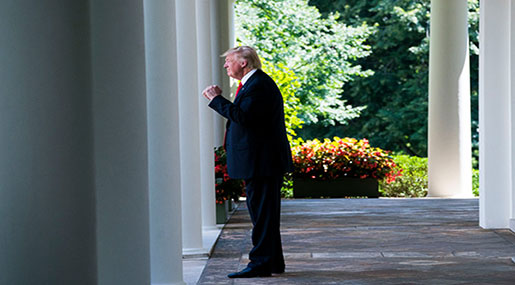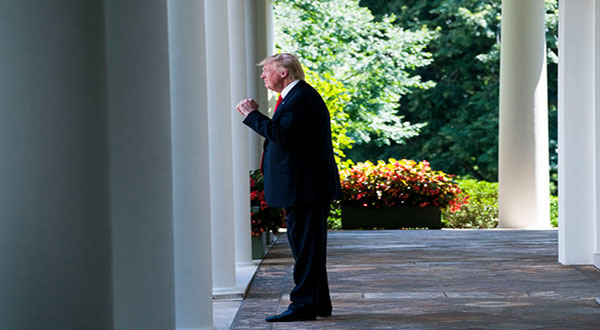
One Day, Three Events, Seven Falsehoods from Trump

Linda Qiujuly
In just a few hours on Tuesday, US President Trump made seven misleading statements: about Middle East politics, during a joint news conference with Prime Minister Saad Hariri of Lebanon; about veterans' affairs reforms, in remarks to "American heroes"; and about jobs and health care, to supporters in Ohio. Here's an assessment.

He claimed Lebanon was "on the front lines in the fight" against Hezbollah, a group allied with the Lebanese president...
Hezbollah is a resistance group that the United States has classified as a terrorist organization since 1997. Its support of President Bashar al-Assad of Syria has drawn criticism from Hariri. But Hezbollah is also a popular political party in Lebanon. The group counts Lebanon's president, Michel Aoun, as a staunch ally and has been fighting against Daesh [the Arabic acronym for 'ISIS/ISIL' terrorist group] in neighboring Syria.
He prematurely said the veterans' medical records system is "fixed."
David Shulkin, the secretary of veterans' affairs, announced in early June that his agency would adopt the War Department's electronic health records system. Negotiations over pricing and how to carry out the change, according to Shulkin, are expected to last three to six months. "This journey is just beginning for V.A.," the department said in a June 28 blog post.
He took undue credit for adding "much more than one million jobs."
The United States has added 1.1 million jobs in 2017, but it's a stretch for the new president to take credit for almost half of them. About 216,000 jobs were added in January, before Trump took office. The 232,000 jobs estimate for February came three weeks into Trump's presidency.
The historic moments, head-spinning developments and inside-the-White House intrigue.
He falsely claimed "a historic increase in military spending."
Trump has proposed a $54 billion increase - about a 10 percent rise - in the Pentagon's budget over last year's spending. There have been at least 10 larger increases to the base military budget since the 1977 fiscal year, including four since 2002. Factoring in war spending, there have been 27 years since 1940 in which military spending was as high as or higher than the proposed increase. As a percentage of gross domestic product, there have been roughly 35 years in which military spending matched or surpassed what Trump is calling for.
He distorted the terms of the Iran nuclear deal, claiming the United States "gave" Iran $150 billion, as well as $1.7 billion in cash.
The money Trump is referring to already belongs to Iran. The $150 billion is a high estimate for Iranian assets previously frozen under sanctions that were lifted by the deal. Other estimates range from $50 billion to $100 billion, some of which is tied up in debt obligations.
The $1.7 billion is a settlement resulting from a decades-old financial dispute. Before the 1979 Islamic Revolution, Tehran purchased $400 million in American military equipment - an amount that, including accumulated interest, snowballed into $1.7 billion - but the United States never delivered the goods. The State Department paid up in 2016 to "retain maximum leverage" and to ensure the return of three American prisoners.
He said immigrants who "immediately go on welfare" should not be able to do so for five years. But they are already prohibited.
The requirements sought by Mr. Trump have largely been in place for two decades, since the passage of welfare reform, or the Personal Responsibility and Work Opportunity Reconciliation Act of 1996.
Legal permanent residents who haven't worked in the United States for 10 years are not eligible for food assistance or Medicaid within the first five years of entering the country. States have the option of waiving the Medicaid rule for pregnant immigrants and children.
Refugees, asylum seekers and victims of trafficking can collect some benefits, up to a point, and immigrants who have served in the military are eligible without a time requirement.
He cited a flawed report to claim large premium increases since the Affordable Care Act's passage.
Stating that premiums have doubled and tripled in various states is one of Trump's favorite critiques of the current health care law. Those figures appear in a May report from the Department of Health and Human Services.
The report compares premiums in 2013, before the law took full effect, with those in 2017. But it looks only at plans in the federal exchange in 2017, versus all plans in the individual market in 2013. It also ignores some facts: The 2017 plans are much more comprehensive and cover more and sicker people, and most people in the federal markets in 2017 receive a subsidy to help blunt premium costs.
Source: NYT, Edited by website team
Comments



